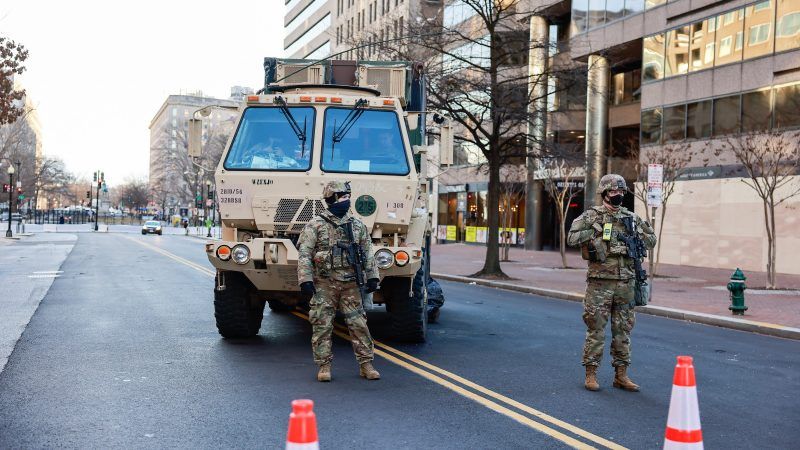Dysfunctional and Disorderly at Home, the U.S. Must Stop Meddling Abroad
Our own house is not in order, and Washington has no business policing the world or forcibly remaking other countries in its own image.

Secretary of State Mike Pompeo was supposed to go to Europe last week. His trip is now canceled.
The State Department says that's because there's work to be done on the presidential transition—a Taiwan visit by U.S. Ambassador to the United Nations Kelly Craft was canceled on the same basis. But Reuters, citing multiple diplomatic sources from the U.S. and Europe alike, reports Pompeo's plans changed "after Luxembourg's foreign minister and top European Union officials declined to meet with him."
Their reasoning, Reuters notes, was not that Pompeo is part of a lame duck administration. It was that these longstanding U.S. allies were "embarrassed" to host Pompeo after this administration's role in the violence in Washington this month—violence Pompeo condemned but for which he assigned President Donald Trump and his enablers no responsibility. Trump is a "political pyromaniac," said Jean Asselborn, Luxembourg's minister for foreign affairs. It is hardly surprising he would not be interested in meeting with Trump's emissary.
This snub should be a lesson for Pompeo personally but, more importantly, for U.S. foreign policy writ large: Our own house is not in order, and Washington has no business policing the world or forcibly remaking other countries in its own image. That image is a mess.
This is true even if Reuters' sources are incorrect and American diplomats really did stay home to work on the transition. The transition needs attention because it has not been peaceful. It has not been respectable. It has not been a model for other countries to imitate.
The storming of the Capitol, which left five people dead and dozens more injured, is the direct result of Trump's self-serving deception about his election loss. "The president of the United States fleeced the American people," as freshman Rep. Nancy Mace (R–S.C.) told CNN's Christiane Amanpour. "People have been lied to for two months now. It's disturbing. It led to this violence."
And while it's true, as Rep. Liz Cheney (R–Wyo.) said, that "none of this would have happened without the president," Trump is not exclusively to blame. He was necessary but not sufficient to produce the chaos we saw in Washington. Trump's behavior in this crisis, as has often been the case throughout his presidency, is predated by many of the dysfunctions to which he contributes.
The public resentment and negative partisanship, the prioritization of power over truth, the sense of grievance and injustice, the belief that crucial political rights and freedoms have been denied—all this existed in our polity before Trump made the leap from reality television. They were intensified this year by the pandemic, the election, and high-profile cases of police brutality. And they will persist after Trump is no longer in office. Our own house is not in order.
And our foreign policy contributes to that disorder. Two decades of war in the greater Middle East, a vast and coercive sanctions regime, and maximalist approaches to diplomacy have all proven counterproductive, strategically disastrous, and inhumane. They sap resources, both intellectual and fiscal, that should be conserved for domestic concerns. Washington has spent trillions on regime change and nation building and attempted to make distant nations fall in line with its wishes. Meanwhile, here at home, all our politics disintegrate.
This is not to say an aggressive, interventionist foreign policy would be appropriate if only Washington could run it better. On the contrary, as then-Secretary of State John Quincy Adams argued on Independence Day of 1821, the United States should be an exemplar, not a coercer: "Wherever the standard of freedom and independence has been or shall be unfurled, there will her heart, her benedictions and her prayers be," Adams charged. "But she goes not abroad in search of monsters to destroy. She is the well-wisher to the freedom and independence of all. She is the champion and vindicator only of her own."
That we could combine example and coercion was the hubristic assumption that undergirded the interventionism of the postwar era generally and the post-9/11 era specifically. But our military-first foreign policy of trying to dominate international affairs has been detrimental to our own politics and governance. It has eroded our civil liberties, exacerbated our fears, run up our national debt, and distracted us from pressing problems at home.
Now, we have troops sleeping on the floor in our Capitol so they can safeguard the inauguration this week, and tiny Luxembourg is embarrassed to meet with our top diplomat. Does that sound like a nation that should be playing world police?


Show Comments (109)